This post was researched and written by Ashley Morrison, a practicum student with Recollection Wisconsin in Spring 2022. Ashley will earn her MLIS from the iSchool at the University of Wisconsin-Madison in May 2022.
Originally titled “NFLO News” for the National Lesbian Feminist Organization – La Crosse Chapter, the Leaping La Crosse News was a vital communication avenue for many lesbians in La Crosse and Western Wisconsin. Running from 1979 to 2007, this monthly newsletter provided a space for lesbians in the area to get national and state news on lesbian and feminist activities, events, legal cases, fashion, and entertainment. The University of Wisconsin-La Crosse (UWL) Murphy Library Special Collections/ARC now holds 317 print issues of the newsletter.

Key members of the lesbian community that made this newsletter possible included Jill Davey, Mary F. O’Sullivan, Lois Blank, Jena Requist, Mary Fitzwater, Nancy Humphries, Jeanne Fischer, and Shelly Koonce. These women wrote the stories, edited the newsletter, handled layout and design, and circulated the newsletter. Additionally, some community members also occasionally submitted their own articles. The creation of these newsletters went from labor-intensive using a portable typewriter to slick with newsletter production done entirely electronic. With the increased accessibility to this information via the internet, the women behind the newsletter decided in early 2007 to stop publication. The final legacy issue (October 2007) of the Leaping La Crosse News included a timeline that breaks down the love and labor these women put into the newsletter.
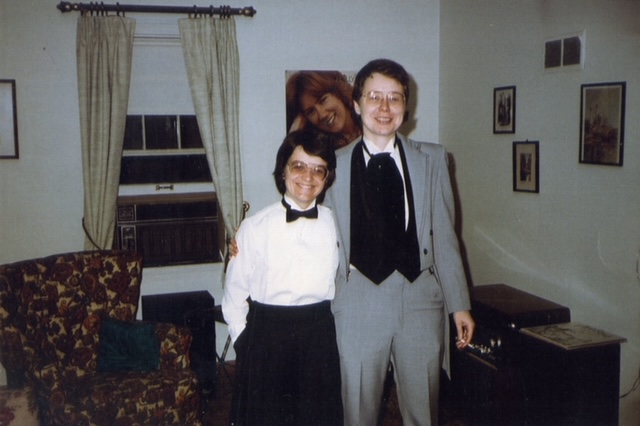
Murphy Library Special Collections/ARC, University of Wisconsin–La Crosse; originally owned and donated by Mary O’Sullivan
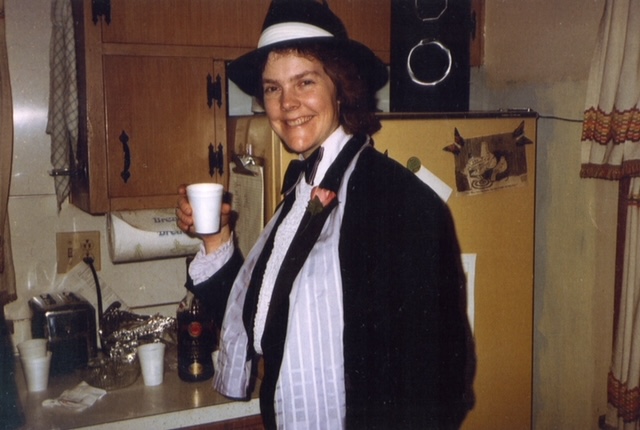
Murphy Library Special Collections/ARC, University of Wisconsin–La Crosse; originally owned and donated by Mary O’Sullivan
Some of the things found in the Leaping La Crosse News include local businesses, organizations, and events. These vital LGBT spaces provided a physical space for the La Crosse lesbian community to meet and interact in a safe space, and discuss important issues with a lesbian experience and perspective. These newsletters also provide insight into the La Crosse lesbian community’s connections with the state and national LGBT communities by including upcoming events and news from other sources. Lastly, the newsletter was a space for asynchronous discussion and communication within the La Crosse lesbian community. Some of the issues and topics found in the newsletter include classism, alcoholism in the lesbian and gay community, diversity, politics, and much more.
Local Businesses and Organizations
Local businesses and organizations in La Crosse and the surrounding area were vital to the lesbian community because they provided a physical space for them to be themselves without concerns of backlash or hostility. Through this newsletter, many lesbians gained access to their community and the safe physical spaces necessary to build a strong connection with other lesbians.
One key feminist organization was Out & About Women. Established in 1980, the organization had more than a dozen feminist women members, many of them lesbians. Out & About Women produced women’s culture and entertainment events in the La Crosse area, focusing primarily on creating lesbian-friendly spaces. These events would have a sliding scale for ticket prices to make events more accessible to all women. Some artists they brought included Holly Near, Kate Clinton, Ferron, Chris Williamson, Heather Bishop, and many others to La Crosse. However, as years passed, the organization shifted focus from producing concerts to other areas of women’s culture, such as hosting the play, Daughters of Africa by Sonia Johnson.
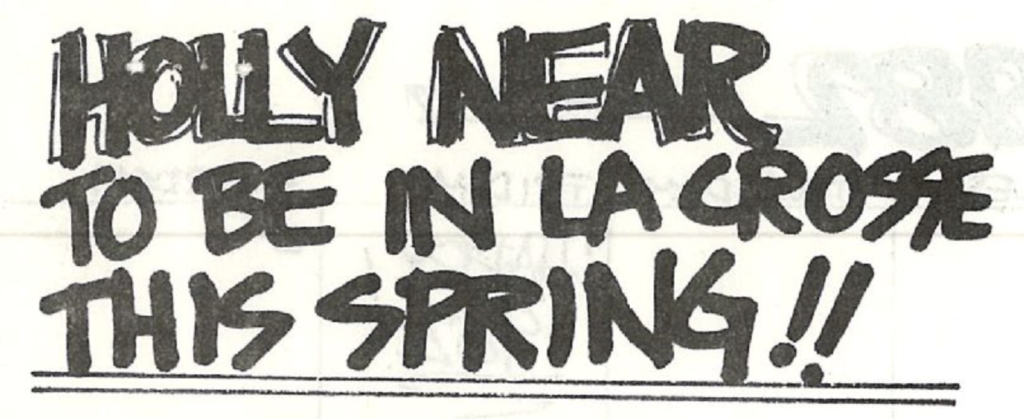
The organization also had a supportive relationship with the Women’s Studies department at UW-La Crosse. Out & About Women donated money to the department and Women’s Studies Student Association and hosted many events at Annett Recital Hall and other UW-La Crosse facilities.
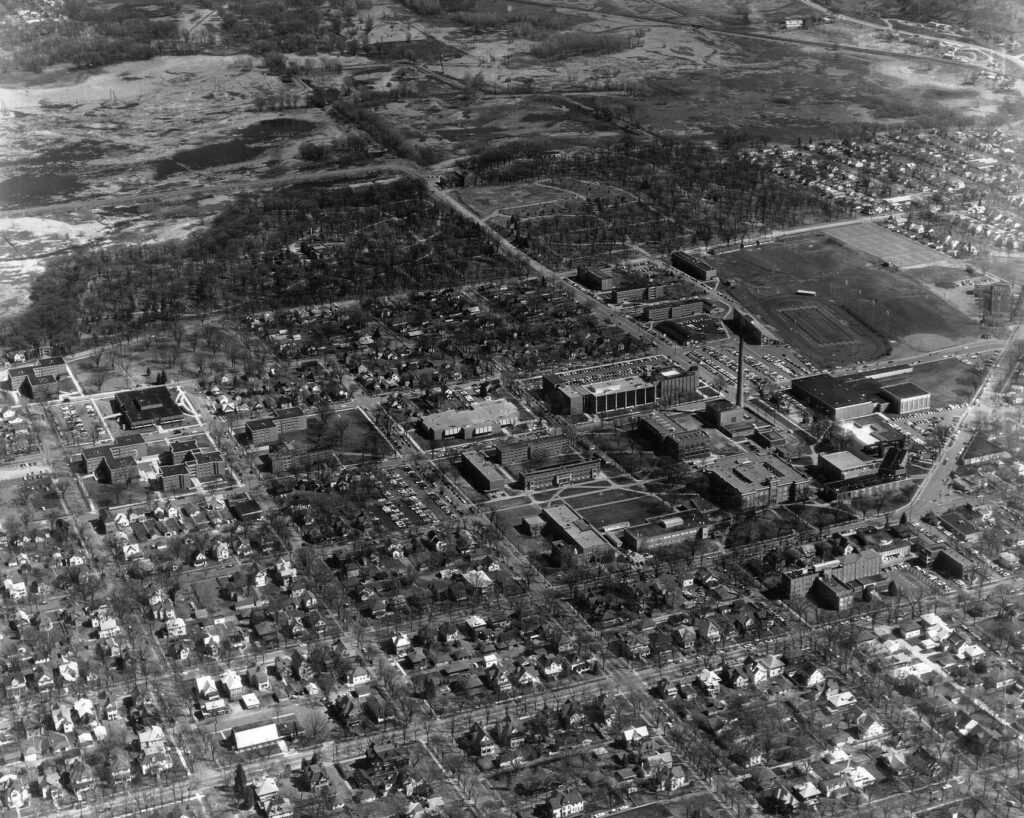
One key event Out & About Women hosted every year was the Tux Party, which started in the early 1970s and was last mentioned in 1997. This event allowed women to dress in a tux or anything else they desired to have a fun night mingling with other women with drinks and food. Every year this event grew and adapted as the community’s needs changed, moving from being hosted at someone’s house to the Mill Road Cafe.
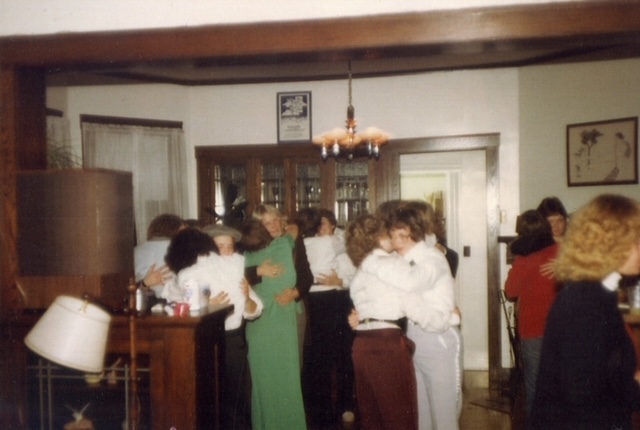
Murphy Library Special Collections/ARC, University of Wisconsin–La Crosse; originally owned and donated by Mary O’Sullivan
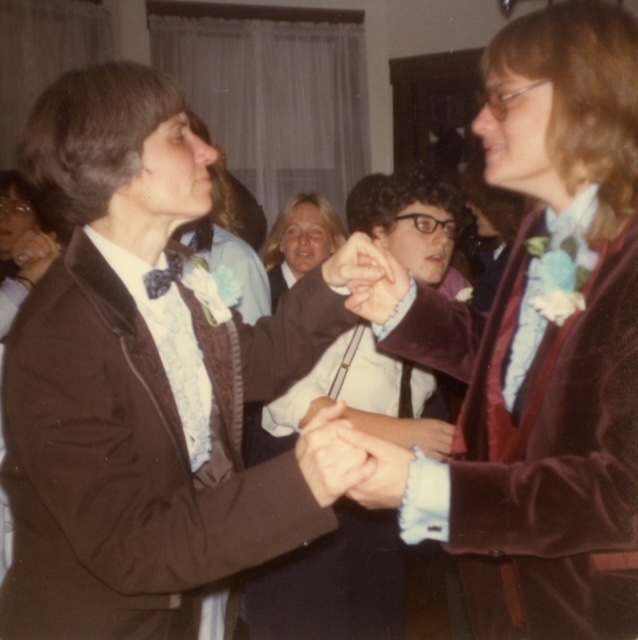
Murphy Library Special Collections/ARC, University of Wisconsin–La Crosse; originally owned and donated by Mary O’Sullivan
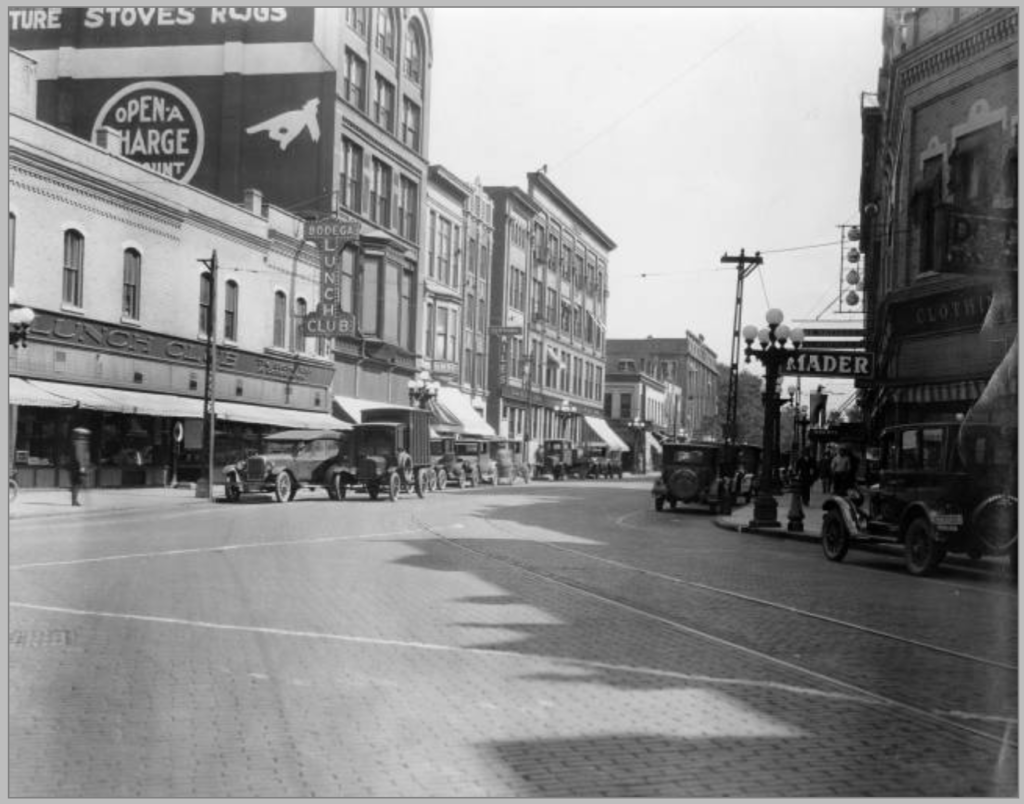
Image of 4th Street and Pearl Street with the Bodega Lunch Club on the left in 1926. In the background, there is a shop “Wile’s Clothing” that later becomes Desmonds. Desmonds Formal Wear was a clothing store where many lesbians in the community bought their tuxes for the Tux Party.
Another organization important to the larger LGBT community in La Crosse is the Gay Alliance of La Crosse Area Youth (GALAXY). It began in 1995 as a project of the La Crosse Alliance for HIV/AIDS Prevention for Youth dealing with issues of sexual orientation. Meetings were held at the Rainbow Revolution Bookstore in La Crosse. In these meetings, LGBT youth had an opportunity to find peer support and discuss HIV/AIDS prevention, healthy relationships, substance abuse, family issues, coming out and peer issues, school issues, and leadership development. The GALAXY organization also advertised consistently in the LLN with information about their meeting times and location.
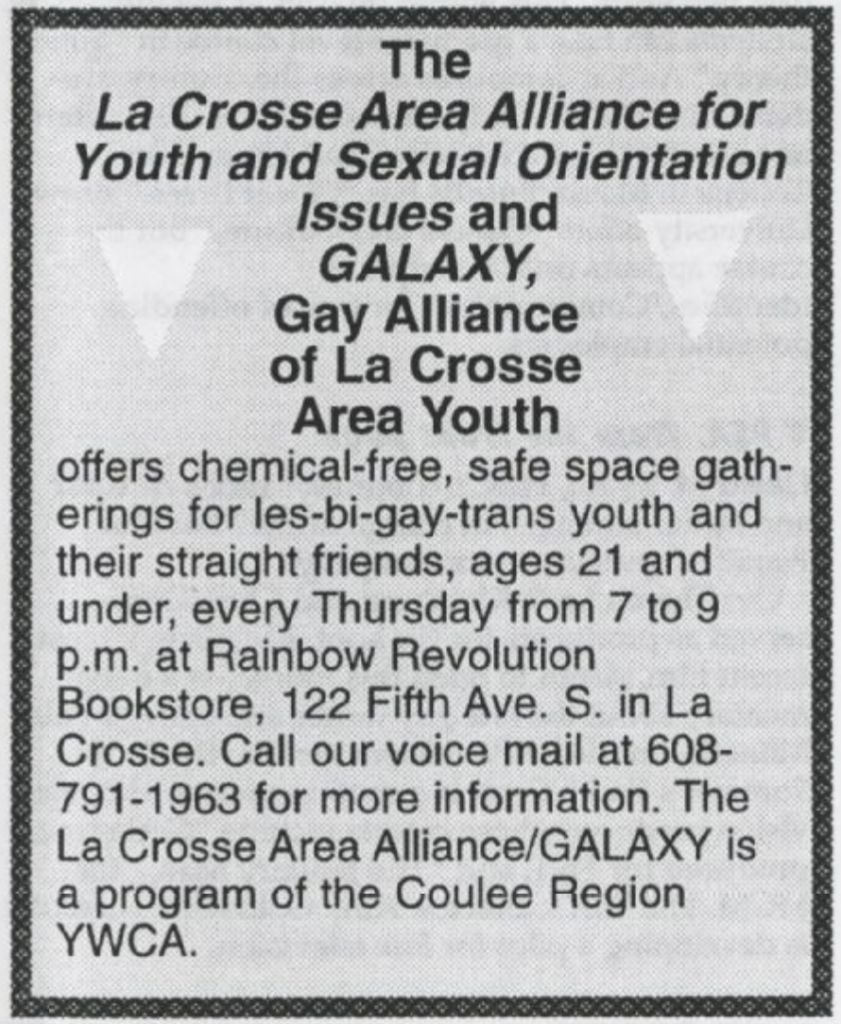
In September 1995, GALAXY attended the Wisconsin AIDS Walk & Conference in Milwaukee with three young people and two adults. During the conference, the young people also presented a progress report as a 1996 Diverse and Resilient Grant recipient. Through this conference and other similar events, the LGBT youth and the La Crosse LGBT community gained valuable leadership skills and connections with other LGBT communities throughout the state and nationally. Additionally, the GALAXY meetings offered a safe space geared towards youth, unlike other spaces found for the LGBT community which were created for adult LGBT members and were predominately bars.
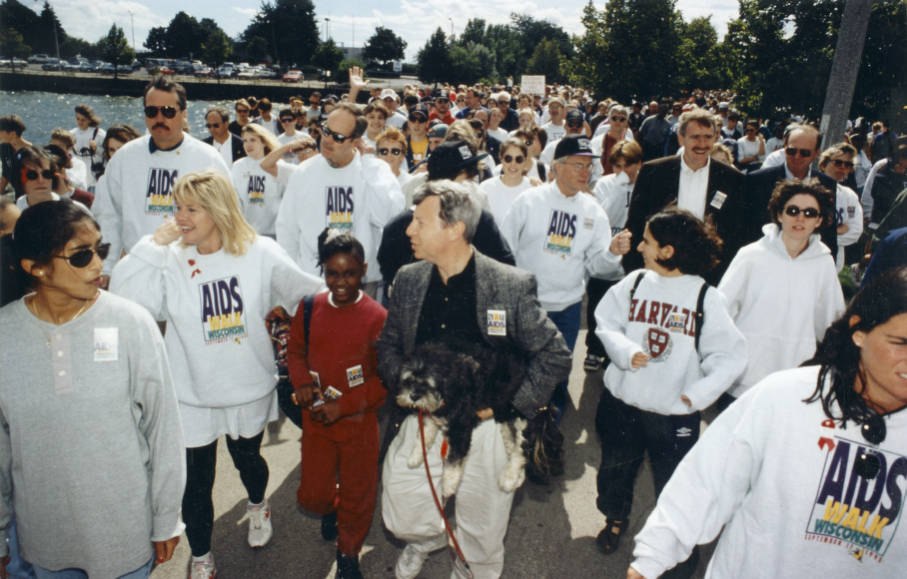
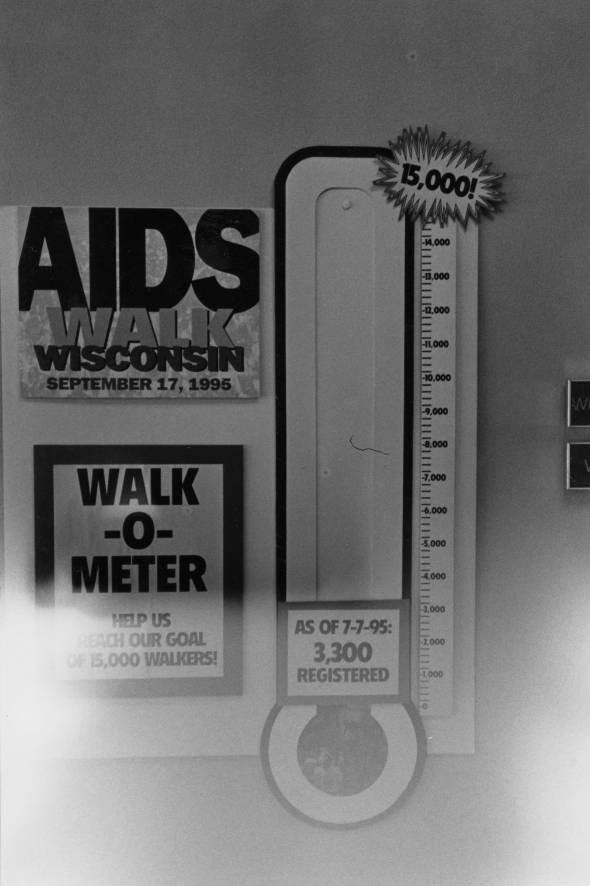
AIDS Resource Center of Wisconsin Records, University of Wisconsin Milwaukee Libraries.
Three central businesses mentioned throughout the Leaping La Crosse News played pivotal roles in creating safe physical spaces for the lesbian community in La Crosse. Opened circa 1978, Mother’s was an inclusive gay and lesbian bar located in downtown La Crosse. It hosted some of the early entertainment put on by Out & About Women, including Chocolate Waters, an important lesbian feminist poet, who would be reading ‘HOT’ poetry. It closed around 1982.
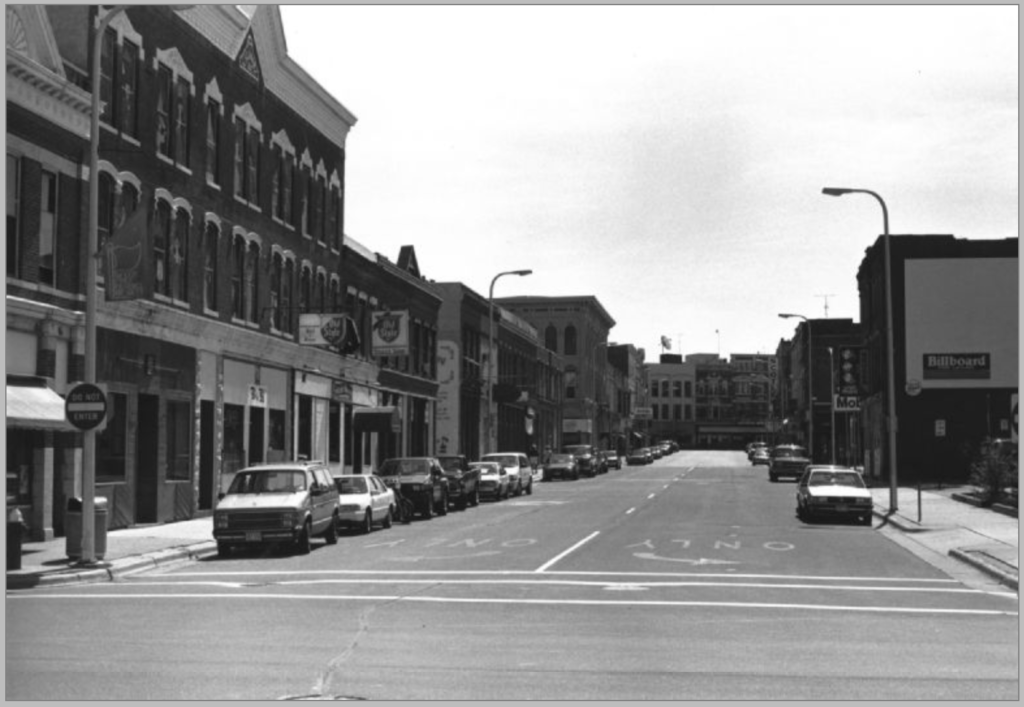
This would have been where the Mother’s Bar was located in the later 1970s and early 1980s.
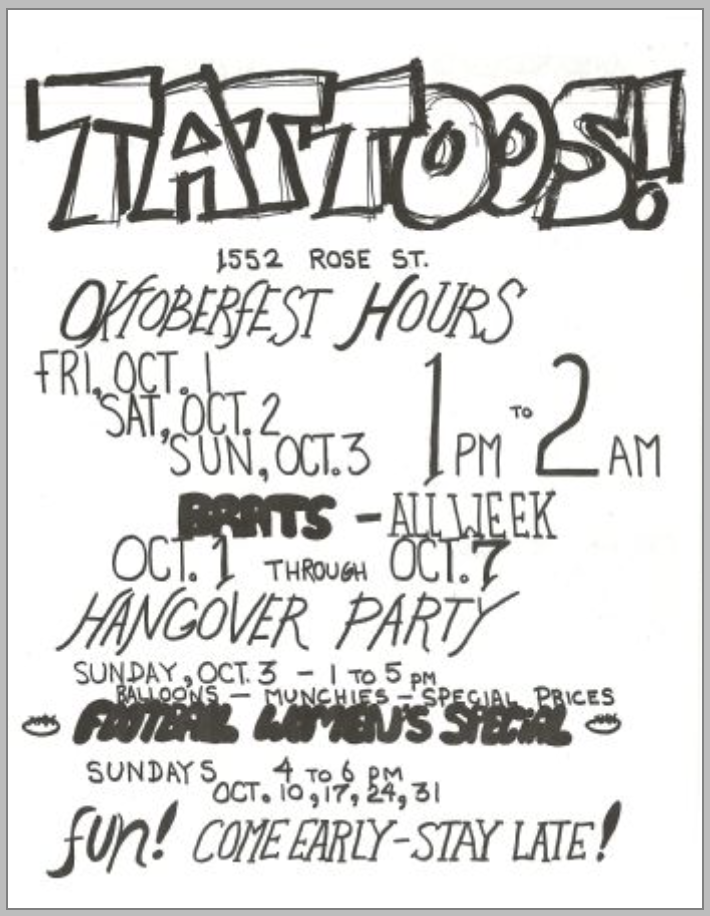
Another women’s bar essential to the La Crosse community was Tattoo’s, which was open from December 1980 to January 1989. Quite a few articles and advertisements reveal how connected the Tattoo’s bar was to the lesbian community. They provided transparent explanations on business decisions and, when first opening, asked for furniture donations. The Mill Road Cafe, located in Galesville, WI, was first mentioned in the Leaping La Crosse News in 1986. The cafe often advertised upcoming concerts of women’s music. These advertisements were usually a full or half-page that listed the women artists performing that month and entry prices to attend the concerts.
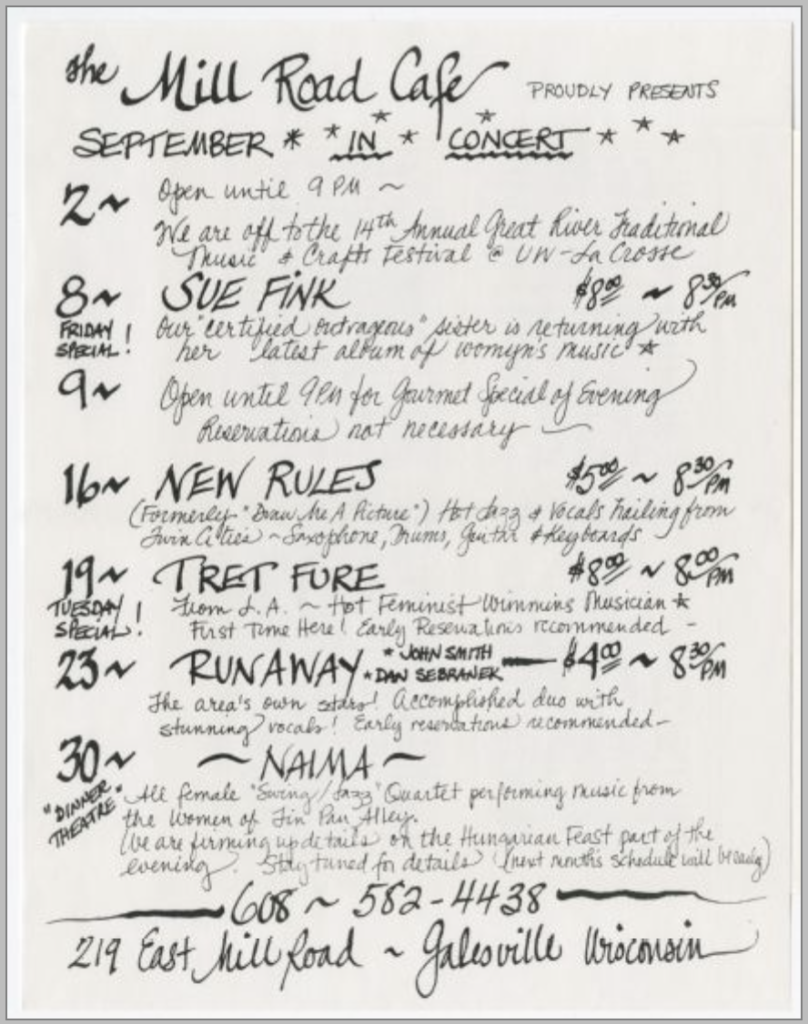
Lastly, a vital component of the lesbian community was potlucks. These potlucks were hosted by various members of the community every month. Additionally, they would be located in La Crosse and in the surrounding towns and countryside. Not only was the LLN used to communicate when and where these potlucks would be, but it also used some of the local businesses to provide further directions.
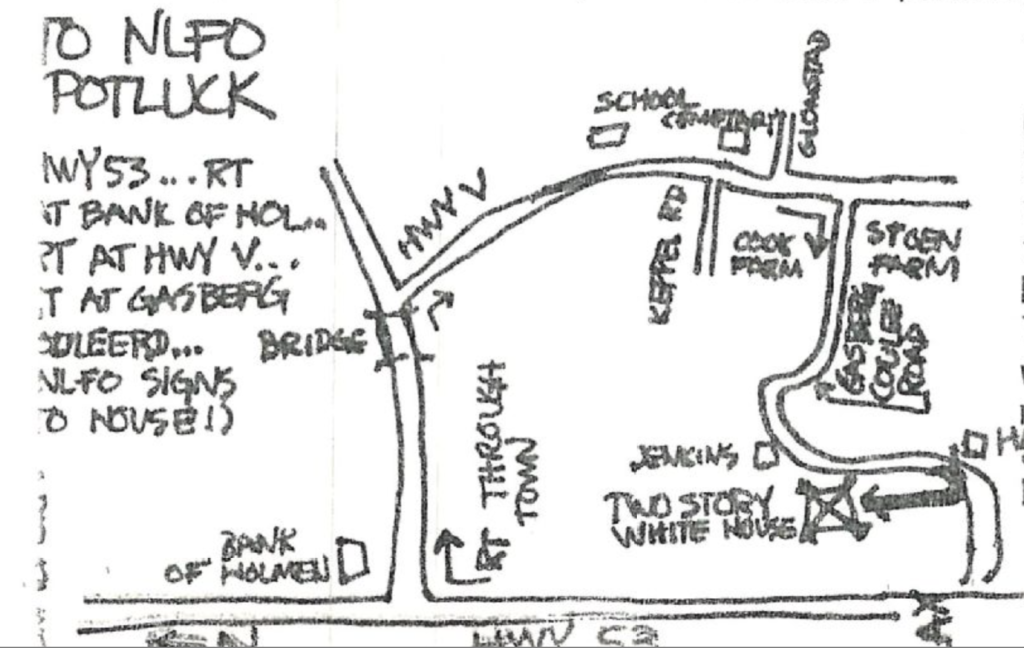
Connections With the Broader LGBTQ+ Community
This newsletter provided a localized lesbian community to emerge and flourish. The newsletter also served to connect the La Crosse lesbian community to other Wisconsin LGBT communities and the larger national LGBT community.
The Leaping La Crosse News shared upcoming conferences, other LGBT newsletters, political news, and support programs and services for LGBT people in other Wisconsin cities and towns including Stevens Point, Eau Claire, Waukesha, Madison, and Milwaukee.

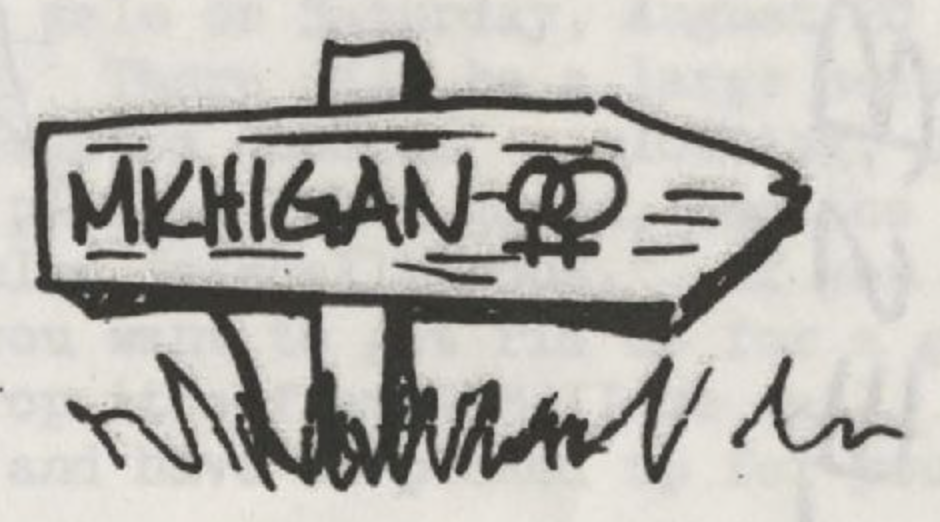
Many national LGBT communities mentioned events and relevant LGBT news happening throughout the continental United States. One notable event was the Michigan Womyn’s Music Festival (MichFest), which ran from 1976 to 2015. This week-long annual event in August was by women for women located on private land. The event empowered many lesbian women by creating an all-woman space for them to listen to music by female artists and connect with other lesbians. Unfortunately, the Festival excluded trans women from attending; in 1991, the Festival management even removed a trans woman from the premises. After criticism from other LGBT organizations, they decided in 2015 to shut down the Festival rather than permit trans women to attend. Advocate wrote an article, Op-ed: Michfest’s Founder Chose to Shut Down Rather Than Change With the Times, to learn more about this.
Discussion of Issues Within La Crosse Lesbian Community
Many of the issues discussed in the Leaping La Crosse News reflect important conversations potentially happening in the various safe spaces for the community. Some of these conversations include classism some working-class lesbians experienced when talking with middle class lesbians, and the alcohol issues found in the lesbian community, which may have resulted in creating a lesbian/gay Alcholics Anonymous group in La Crosse. There was also lots of political activism found in every newsletter issue; some highlights include lesbians’ place in the AIDS crisis and decisions on political candidates. There were articles ranging from discussing the appropriation of Native American spirituality to women’s cultural productions put on by Out & About Women.
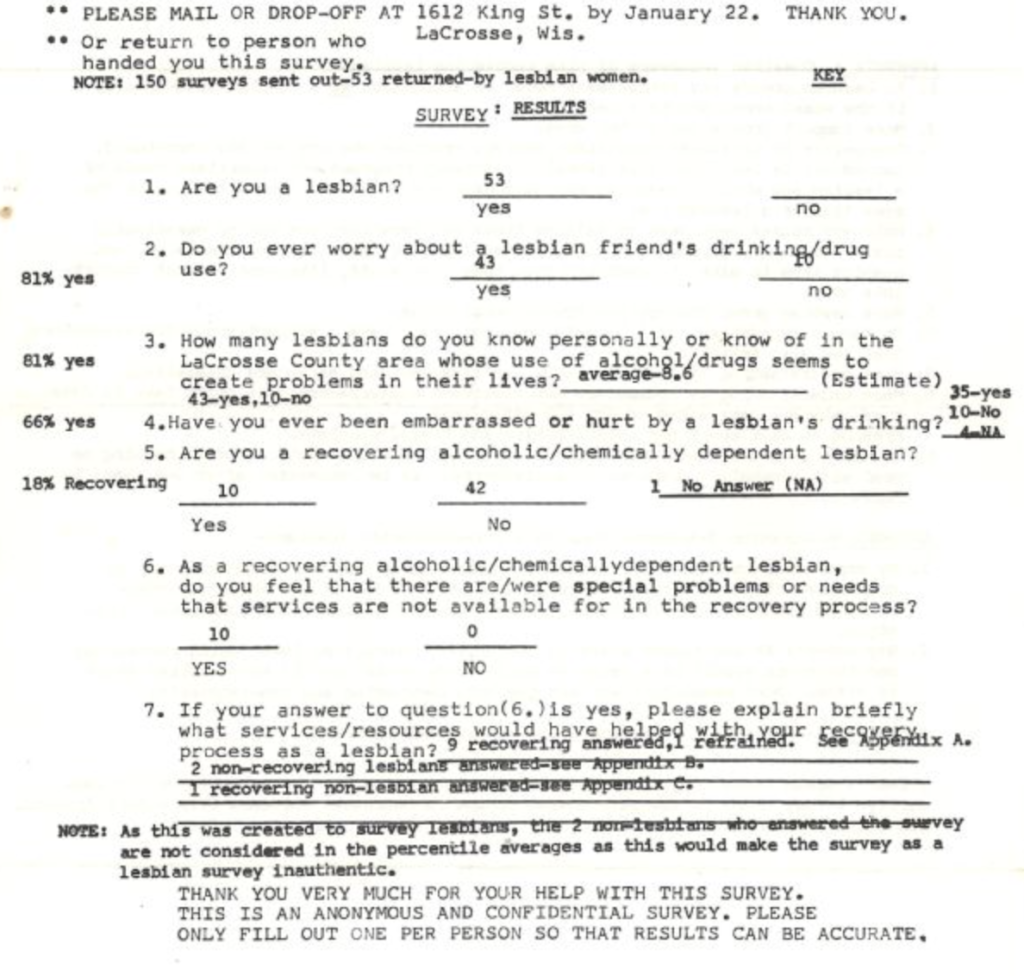
![Appendix A.--Question 7--answers of nine recovering lesbians:
1. AA Lesbian groups and Intreatment focus on alcoholism as a lesbian side-by-side if the woman knows she is a lesbian.
2. more support groups around the area.
3. counselors in treatment/outpatient therapy programs who are not too threatened, turned-off by lesbians, more people in recovery programs who understand needs of a lesbian and what it means to not just have the stigma of alcoholism but at the same time of a lesbian too.
4. half-way houses more open to helping those who know they are gay or questioning their sexuality, giving them support, helping them make their own decision, not pushing them to make the decision that they, the staff, like, want, or feel comfortable with.
5. more lesbian group therapy for drug/alcohol abuse.
6. To have a support (AA) that I could come out in-to have a support group for alcoholics that was also feminist.
7. more understanding of lesbian needs, in treatment and aftercare counseling.
8. More understanding by counselors and treatment centers-straights [don't] have to date gays, why are gays asked to try the other way? Freedom to talk about our relationships and living problems.
9. Counselors that are not more curious in my sex life than interested in helping me deal with alcohol. I consider myself recovered. To be recovering after 3-4 years is defeatist.
Appendix B.--Question 7--Answers given by 2 non-recovering lesbians
1. my experience in counseling alcoholics indicates a need for supportive gay AA groups as well as treatment centers being well versed in the areas of understanding lesbians- psycho-social, as well as acceptance of the individual life-style.
2. Gay women's AA and Al anon would be useful, very useful! My lover being recovering and therefore myself in a sense as well-I sure could use it! We've talked about it often. More counselors who are gay, recovering and non-recovering.
Appendix C.-Question 7. One recovering non-lesbian answered.
I feel a woman needs to work through her alcoholism before she can work on her sexuality. I feel there is adequate womans groups in La Crosse - Guidence Clinic, Mari Arneson, LaX Lutheran Hospital-Sally Sibald, St. Francis Medial Center, Carol Tucker.](https://recollectionwisconsin.org/wp-content/uploads/2022/04/LLN-Survey-Appendix--1024x869.png)
Other Resources:
- LGBTQ History Subject Tag of other digital collections hosted by Recollection Wisconsin
- WI LGBT History Project
- Madison LGBTQ+ Archive
- OurLives Magazine
- We Will Always Be Here
- We’ve Been Here All Along: Wisconsin’s Early Gay History
- Coming Out, Moving Forward – Wisconsin’s Recent Gay History
- 8 Things You Should Know About Two Spirit People article
- LGBTQ+ Resources from Wisconsin Historical Society
- Mary O’Sullivan’s Hear, Here story about the Tux Parties
- Hear, Here story about Rainbow Revolution
- Hear, Here story about gay bars downtown and how straight women made these spaces less safe
- Hear, Here story on experience at Mothers

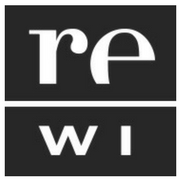
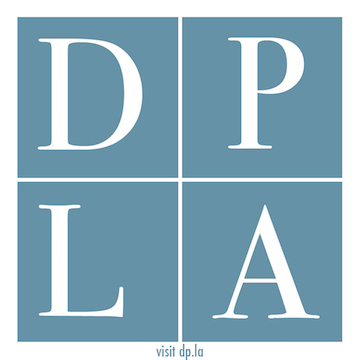
You must be logged in to post a comment.